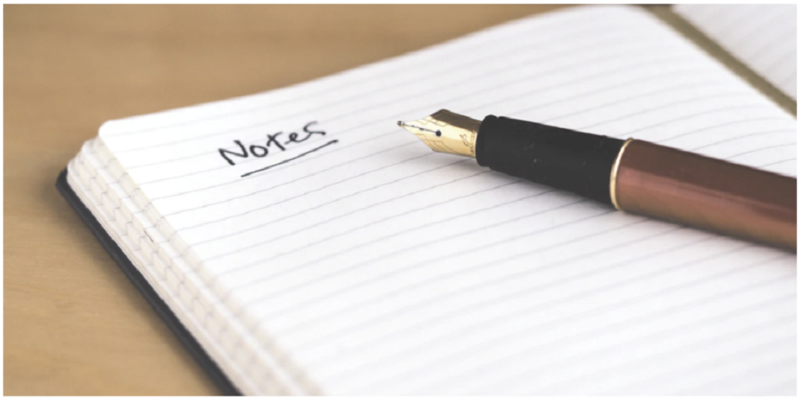
One key aim from coaching is to support the people we work with to become self sufficient. It is therefore important to agree early on, how the discussions that take place during a coaching session will be capture and tracked. This is the same for any completed actions or follow up activity too. So what approach could you use?
Asking your client to bring a pen and paper to their session will enable them to quickly jot down some bullet points or make notes. This will give them a record of what was said or discussed and can be helpful to them between sessions.
Their notes can also help you look back at the start of the session so you both remember what was discussed and agreed when you last talked. And again at the end of the session so you both agree what they will work on or try to achieve before you see them next. We also know that writing something down will not only provide them with a record they can keep, but can also help them anchor the information within the brain.
But don’t forget, many of your clients will be making full use of technology within their working day to make some quick notes in a meeting or record short reminders so they remember what was being said. So whatever solution you discuss, it must fit their way of working and support them to capture, track and complete any activities between coaching sessions.
One approach we use, is to provide our clients with a coaching logbook. This can be used by them to not only make their own notes during the coaching session, but also track progress between the sessions.
You can shape the tool so it mirrors the coaching process you are using and helps guide your client through. It can also prompt them to complete any preparation needed before attending their next session. But depending on the way you use it, a coaching logbook can help open up a much deeper discussion and enables you to explore a wider range of ideas and topics.
We know it can sometimes be difficult to guarantee results, especially if your client has any motivational issues or does not invest goodwill and / or the necessary energy required to succeed. So using a tool like a coaching logbook will help encourage autonomy and hopefully eliminate the need for ongoing assistance to achieve success.
But as the coach, it is important for you to make your own notes and ensure you are tracking any progress, completed tasks or the work taking place towards your client achieving their goals. However, your clients should not rely on you to remind them what they should be doing or what was discussed and agreed at previous coaching sessions.
If you would like to provide your clients with a professional coaching tool that helps them track their own progress and builds autonomy, check out our new kit in the online shop:
Coaching Logbooks for your clients – This kit has an executive coaching logbook and a general coaching logbook designed to help guide your clients through the coaching process and prompt discussions.
We constantly add content to the site, so please check our on-line shop and look at the full range of games, ebooks and kits. Or read some of the other blog posts written by our team of international coaches.
Please note – Our blog posts can only be shared if you include a reference and link back to the original source: (cc) MyCoachingToolkit.com – 2023